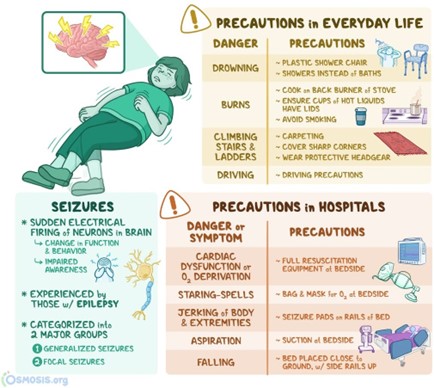A nurse is teaching a client who has a new diagnosis of venous insufficiency. Which of the following instructions should the nurse include?
"Apply ice packs to your legs."
"Place your legs in a dependent position while in bed."
"Remain on bed rest."
"Use elastic stockings."
The Correct Answer is D
Using elastic stockings is an effective way to improve venous return and prevent edema, stasis, and ulceration in clients who have venous insufficiency. The stockings should be applied before getting out of bed and worn throughout the day.
"Apply ice packs to your legs." is not appropriate, as ice packs can cause vasoconstriction and impair blood flow to the legs, worsening the condition.
"Place your legs in a dependent position while in bed." is not advisable, as dependent position can increase venous pressure and fluid accumulation in the legs, leading to edema, pain, and skin breakdown
"Remain on bed rest." is not necessary, as bed rest can reduce muscle contraction and impair venous return. The client should be encouraged to perform regular exercise, such as walking, to enhance circulation and prevent complications.
Nursing Test Bank
Naxlex Comprehensive Predictor Exams
Related Questions
Correct Answer is B
Explanation
Frothy sputum is a sign of left-sided heart failure, due to the pulmonary congestion and impaired gas exchange. The sputum may be pink-tinged or blood-streaked, indicating pulmonary edema.
a. Dependent edema is more likely to be seen in clients who have right-sided heart failure, due to the increased venous pressure and fluid retention. The edema is usually symmetrical and affects the lower extremities, abdomen, and sometimes the face.
c. Nocturnal polyuria is not a specific finding of left-sided heart failure, but it may occur in clients who have renal impairment, diabetes mellitus, or diuretic therapy.
d. Jugular distention is another sign of right-sided heart failure, due to the increased central venous pressure and backward flow of blood into the superior vena cava. It is visible as a bulging of the neck veins, especially when the client is in a semi-Fowler's position.
Correct Answer is D
Explanation
The nurse should place a towel under the client's head to protect it from injury during the seizure. The nurse should also loosen any tight clothing, remove any objects that could harm the client, and maintain a patent airway.
Place the client in a prone position is wrong because it can compromise the client's breathing and increase the risk of aspiration. The nurse should place the client in a side-lying position after the seizure to facilitate drainage of oral secretions and prevent aspiration.
Holding the client's arms and legs still is wrong because it can cause injury to the client or the nurse. The nurse should not restrain or interfere with the client's movements during the seizure but rather ensure a safe environment and observe the seizure activity.
Leaving the client to get help is wrong because it can endanger the client's safety and well-being. The nurse should stay with the client during the seizure and call for assistance if needed, but not leave the client alone or unattended.

Whether you are a student looking to ace your exams or a practicing nurse seeking to enhance your expertise , our nursing education contents will empower you with the confidence and competence to make a difference in the lives of patients and become a respected leader in the healthcare field.
Visit Naxlex, invest in your future and unlock endless possibilities with our unparalleled nursing education contents today
Report Wrong Answer on the Current Question
Do you disagree with the answer? If yes, what is your expected answer? Explain.
Kindly be descriptive with the issue you are facing.
